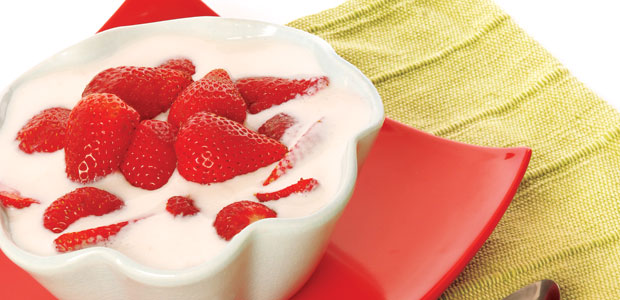Advertisement
Tangy Tasting Kefir
Kefir is a fermented milk drink that enhances digestion and restores intestinal flora. Made from the whole milk of many mammals, including cows, sheep, goats, yaks, or reindeer, kefir is tantalizingly tangy, even when flavoured with fruit and sweetened with honey. Kefir is cultured from kefir grains–seedlike pellets made from insoluble milk caseins that are … Continued

Kefir is a fermented milk drink that enhances digestion and restores intestinal flora. Made from the whole milk of many mammals, including cows, sheep, goats, yaks, or reindeer, kefir is tantalizingly tangy, even when flavoured with fruit and sweetened with honey.
Kefir is cultured from kefir grains–seedlike pellets made from insoluble milk caseins that are removed from previous batches of kefir. Different from the bacteria used to ferment yogourt, kefir grains contain a dozen or more kinds of microbes, including lactobacilli, lactococci, yeasts, and a vinegar bacteria.
Fountain of Youth?
It was Nobel Prize winner Ilya Mechnikov of the Pasteur Institute of Paris who, in 1904, investigated the health benefits of kefir. Impressed by the longevity of Bulgarian peasants who ate large amounts of milk soured with various bacterial cultures, he discovered that these bacteria kill disease bacilli in the large intestine.
Modern research has confirmed that Lactobacillus creates an environment in the large intestine that is unfavourable to harmful bacteria such as E. coli. Beneficial Lactobacillus in kefir break down milk sugar into lactic acid and create an inhospitable environment for intestinal bacteria that cause putrification and gas. Consequently, it is recommended that we eat kefir and other fermented milk products on a regular basis.
Buying Kefir
Read kefir labels carefully. Kefir must contain live, active cultures for nutritional benefit. Avoid additives (nonfat milk powder), stabilizers (such as gelatin), and artificial sweeteners or colours.
Also pay attention to expiry dates and keep refrigerated. Once opened, a container of kefir will last one week.
Kefir is a nice alternative to yogourt and should be part of your natural foods pantry.
In the Kitchen
Kefir is available in custard form or as a beverage. Spoon the custard over apples, cantaloupe, granola, or other whole-grain cereals. Blend the liquid with fresh or frozen bananas, strawberries, or pears to make smoothies. Or use kefir as a substitute for buttermilk in baking or as a base ingredient in salad dressings.
Other Fermented Milk Products
Koumiss (also spelled “kumis”)–Mongolian champagne traditionally made by fermenting mares’ milk, which contains more sugar than cows’ milk and results in a significant alcohol content
Buttermilk–commercially prepared dairy product made by adding lactic acid bacteria to cows’ milk
Yogourt–milk thickened with a culture of Streptococcus and Lactobacillus, as well as L. acidophilus, L. casei, and Bifidobacterium




